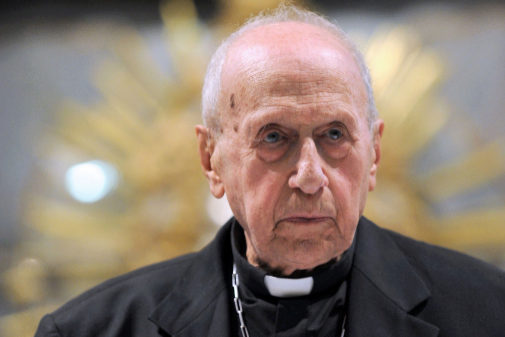John Paul II called him "my special envoy" or "the cardinal of impossible missions." Roger Etchegaray ( Ezpeleta , 1922) combined three passions in his life, which led him to the dome of the Vatican Curia and the world political scene: the Church, the Basque Country and politics. The latter understood in the Vatican way, as mediation between parties and construction of bridges. Three loves to which he was faithful until his death this Thursday at the age of 96.
Tall, thin, muscular and pure fiber, he possessed a special magnetism and, perhaps for that reason, soon stood out in the French ecclesiastical universe. Ordained a priest in 1947, Pope Paul VI appointed him, at age 47, auxiliary bishop of Paris and a year later, in 1970, archbishop of Marseille .
After only five years, in 1975, he was elected by his fellow president of the French Episcopate. Before such a brilliant career, John Paul II created him cardinal in 1979 and on April 8, 1984 he appointed him president of the Pontifical Council for Justice and Peace and president of the Pontifical Council Cor Unum . The second position remained until 1995 and the first until 1998, when he resigned due to age limit.
In both positions he served with his natural elegance and his privileged intelligence as a man of the world with very simple customs, as well as a master in filing rough edges and joining opposites. Perhaps that is why John Paul II used it, for decades, as the progressive and committed touch of his curial government and as his plenipotentiary ambassador.
His impossible missions were countless. He organized the historic Peace Meeting of Assisi in 1986 between representatives of the main religions, when some more rigorous cardinal voices spoke of "syncretism" and when in the world, divided into blocks, the drums of an eventual nuclear war sounded. He also fully supported Wojtyla's initiative to apologize for the Church's faults in the Jubilee of 2000.
He carried out important diplomatic missions for the Holy See: in May 2002 he was in Jerusalem to ask for peace in the Middle East and in February 2003, in Baghdad to carry the message of reconciliation of the Pope and try to avoid the second Gulf war.
He was also the architect of Pope Wojtyla's visit to Cuba in 1998, he went to put out the fire of former priest Bertrand Aristide in Haiti or to try to placate the spirits after the Rwandan genocide. On several occasions he exercised his good offices between Palestinians and Jews and, even, in communist China, who persecuted the Church and looked suspiciously at the Vatican or at the Chiapas of Subcomandante Marcos .
He opted for mediation to solve ETA terrorism
Deeply Basque (he always played with a chapel) but with a universal heart, where he really demonstrated his mediation skills, combined with his love for the land, it was in the Basque Country, where he played an active role in the attempts to reach a dialogue solution to the terrorism of ETA.
Master of dialogue, Etchegaray always opted for reconciliation and the search for social understanding. By pure question of fidelity to the evangelical principles. And with more reason if it is a conflict between Christians in their beloved Basque land.
Already on October 2, 2000, Vatican diplomacy was offered to the Spanish and Basque governments to "contribute to a peaceful solution" in the Basque Country. A contribution that Rome entrusts, a few years later, precisely to Cardinal Roger Etchegaray, the "capped" negotiator. That of which neither party speaks, to preserve their good offices.
Deep connoisseur of the Basque reality, he always maintained a perfect harmony with ecclesiastics and bishops of all sectors. He was a friend of Monsignor Setién and Monsignor Uriarte , but he also got along very well with Monsignor Blázquez or with Cardinal Rouco Varela himself .
Since he perfectly fulfilled the three conditions of a good mediator (knowing the subject thoroughly, having prestige and enjoying the trust of all the parties involved), he played, on several occasions, the role of "notary" in meetings between representatives of Moncloa and the ETA leaders. The same one that his friend, the bishop of San Sebastián, Juan María Uriarte , already exercised in the negotiations that the Aznar Executive and the armed band started in 1999.
Good climber, he was used to being content with few things, but he always kept his eyes on wide and future horizons. He used to say that "no peace established by an agreement can be maintained if it is not accompanied by peace of heart." And he riveted, with a phrase in which his mystical or contemplative vein came out in action: "But only God can sweeten hardened hearts." For all this, the Church and the people mourn him. Because, as Pope Francis himself acknowledges, in his sympathy telegram, "he was a jealous pastor and loved by the people he had been called to serve."
According to the criteria of The Trust Project
Know more- ETA
- Paris
- Basque Country
- China
- Cuba
- Parot doctrine
- Religion
Terrorism Find a bullet with explosives in France that police attribute to ETA
Basque Country The Basque Country embraces again the Tour of Spain
Summit starts the G7 of Biarritz under strong security measures

